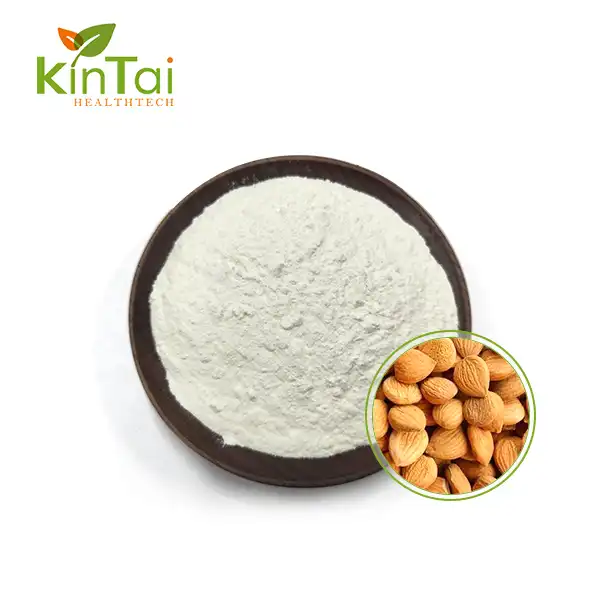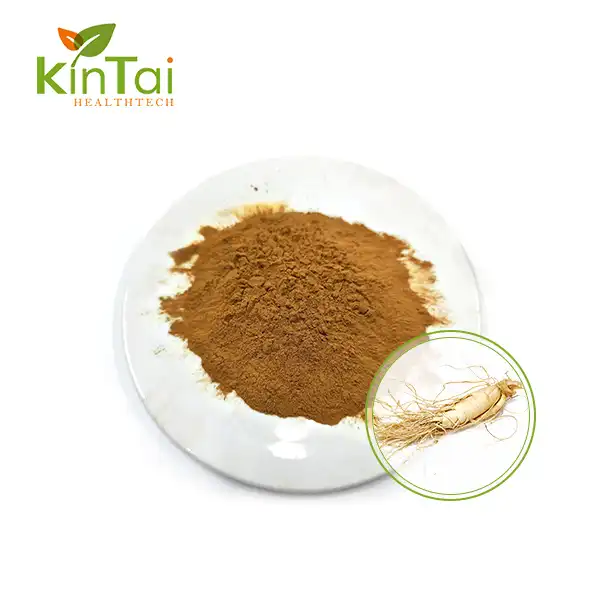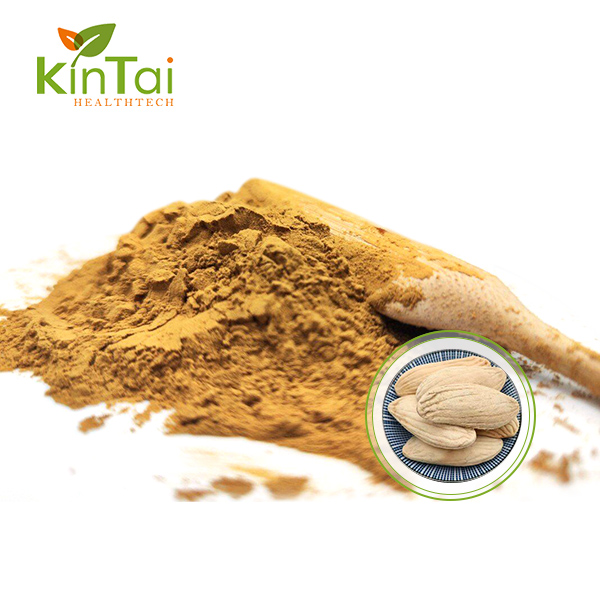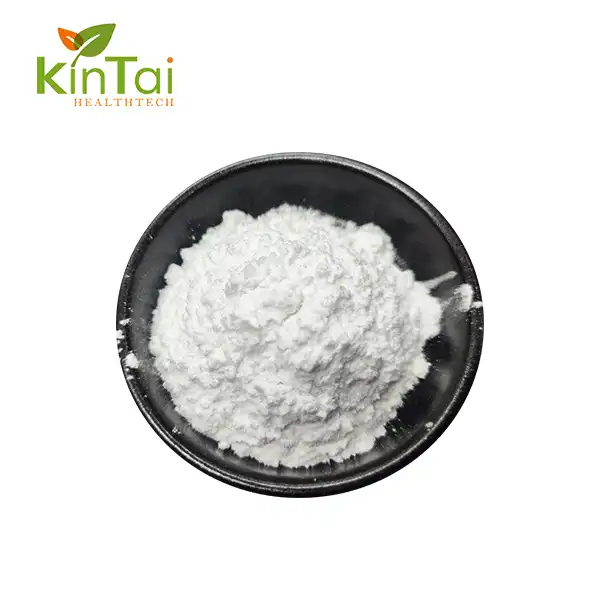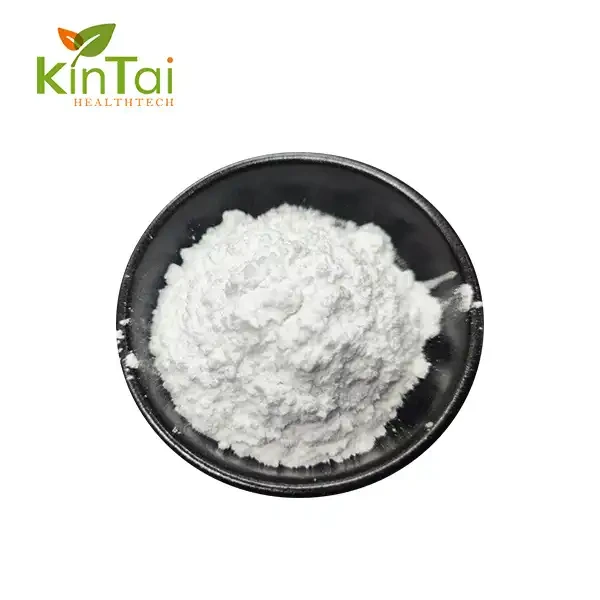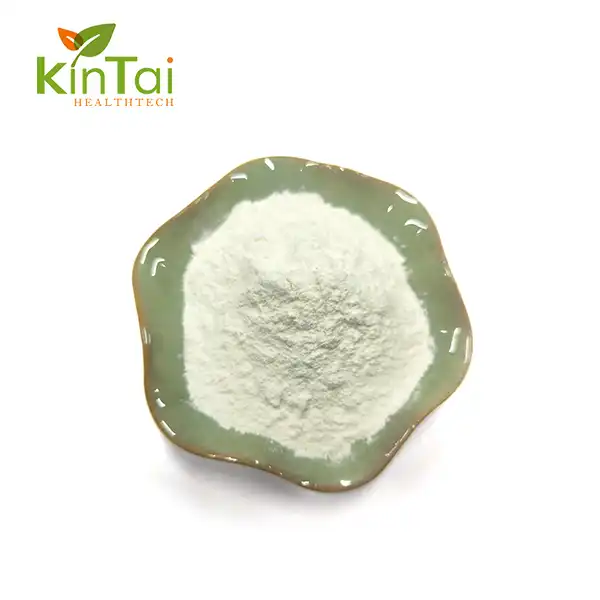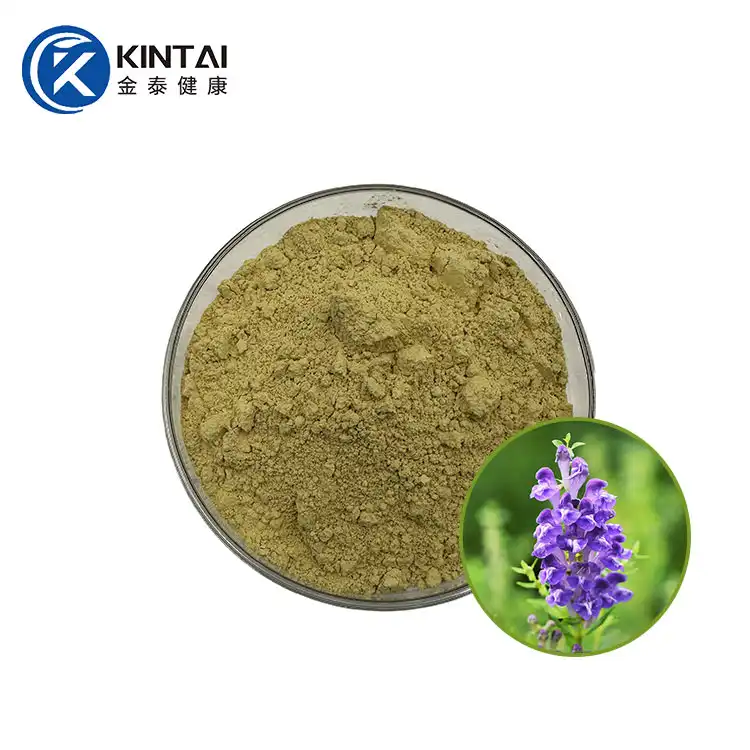Rosmarinic Acid Powder
Specification: 98% Rosmarinic acid
Extract Source:100% Natural
Origin:China
Test Method: HPLC
CAS Registry No: 20283-92-5
Appearance: White powder
Sample: Free sample available
MOQ:1kg
Storage: Cool dry place and avoid light
Payment: Multiple terms acceptable like T/T, L/C, DA
Production Capacity: 100KG/month
Delivery Time: Delivery within one day from the warehouse
Shelf Life: 24 months
Certifications: GMP, ISO9001:2015, ISO22000:2018, HACCP, KOSHER and HALAL
Company Advantage: Kintai mainly focuses on the production of high-content plant extracts and pharmaceutical intermediates all year round
- Fast Delievery
- Quality Assurance
- 24/7 Customer Service
Product Introduction
Rosmarinic Acid Powder Manufacturer and Supplier
Heathkintai® is a professional plant extract manufacturer and research and development company. We have a dedicated R&D team and a large-scale production facility. For over a decade, kintai has specialized in producing high-purity rosemary extract, specifically rosmarinic acid powder, derived from rosemary stems and leaves. Our rosmarinic acid, with a purity exceeding 98%, exhibits excellent water solubility and exceptional stability, making it an ideal raw material for a wide range of applications, including natural food preservatives, cosmetics, health supplements, and pharmaceuticals.
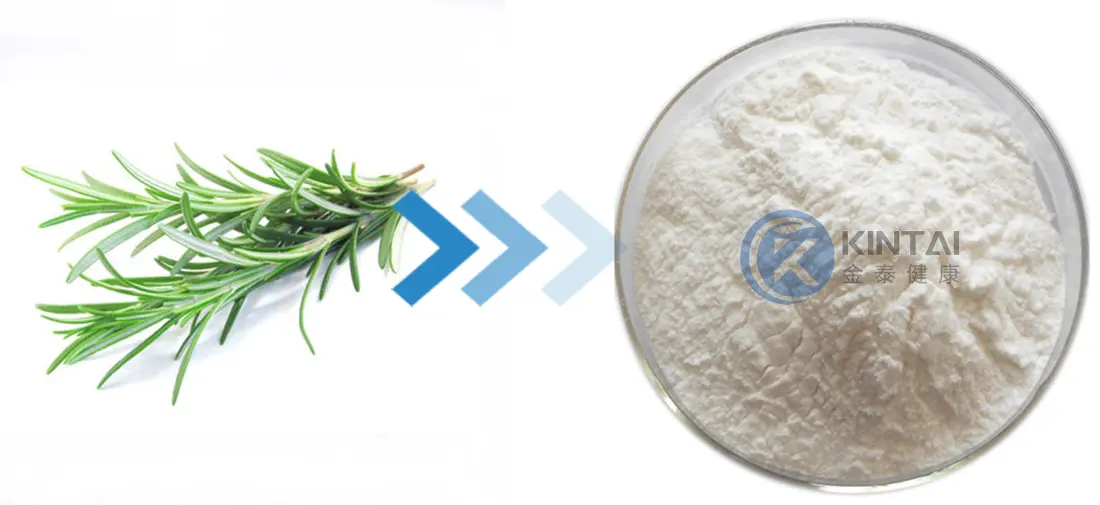
As a leading rosmarinic acid supplier in China, we boast a monthly production capacity of 800 kg and ample inventory, offering highly competitive factory-direct wholesale pricing. We also provide free samples and support product customization to meet your specific needs.
KINTAI Rosmarinic Acid Powder COA
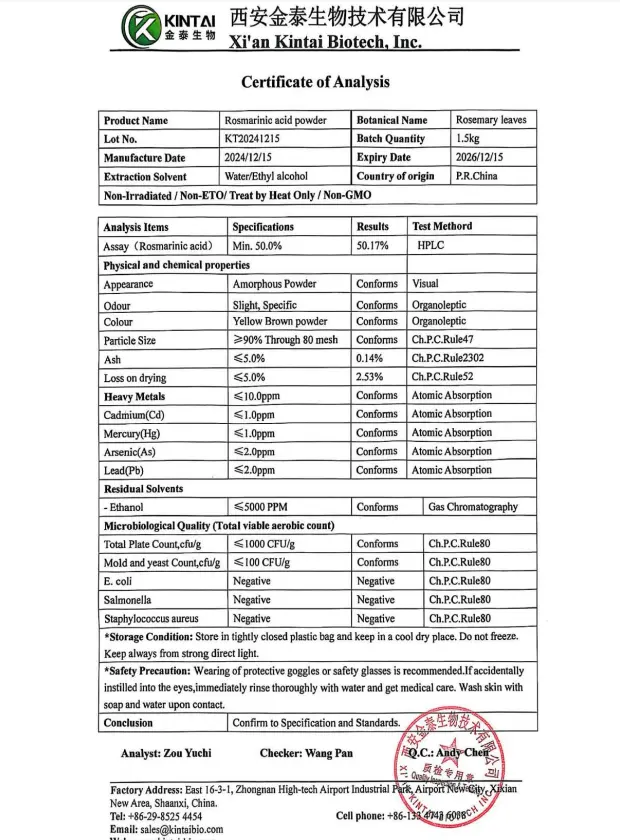
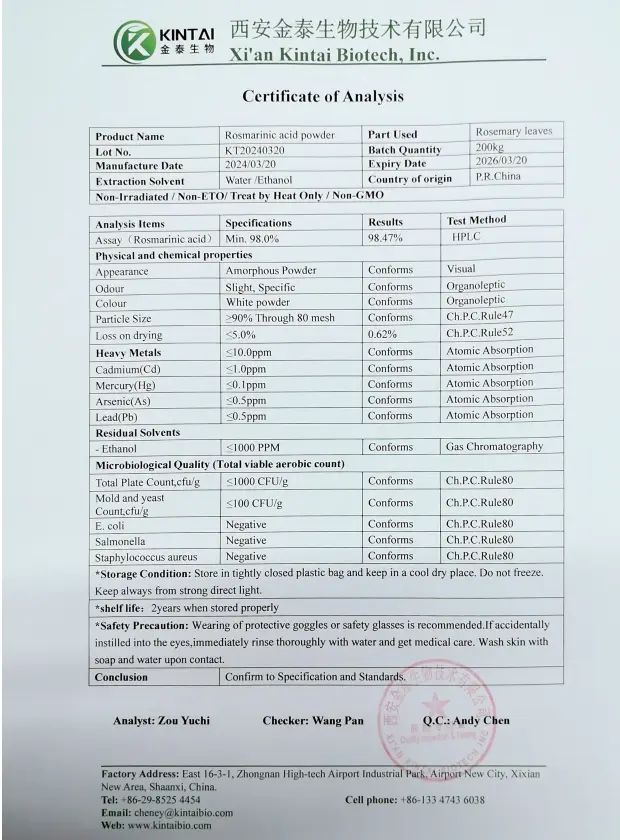 KINTAI 98%Rosmarinic Acid COA
KINTAI 98%Rosmarinic Acid COADosage of Rosmarinic Acid
|
Application Field |
Purpose |
Recommended Dosage Range |
Notes & Considerations |
|
Dietary Supplements |
General Antioxidant Support |
50 mg - 500 mg per day |
Often found in blends. A common standalone dose is between 100-300 mg daily. Always follow product-specific labels. |
|
Anti-inflammatory / Immune Support |
200 mg - 600 mg per day |
Doses in clinical studies often fall within this range. Higher doses should be used under guidance. |
|
|
Skin Care Cosmetics |
Creams, Serums, Lotions |
0.1% - 1.0% |
Effective for antioxidant, anti-aging, and brightening benefits. Well-tolerated at these concentrations. |
|
Food Preservation |
Fats & Oils, Meat Products |
0.01% - 0.1% (100 - 1000 ppm) |
Used as a natural antioxidant to retard rancidity and extend shelf life. Often combined with Vitamin E. |
|
Beverages, Bakery Goods |
0.005% - 0.05% (50 - 500 ppm) |
Lower doses are sufficient for protecting against oxidation in water-based or complex matrices. |
Interested?We'd love to send you a free sample! CONTACT US>>>
Rosmarinic Acid Powder Safty
- Regulatory Approval and Compliance:It is approved as a food additive and dietary supplement ingredient by the US FDA, the EU EFSA, and other agencies. It is legal and safe for use within the prescribed dosage.
- Toxicology Research Support:Several studies have demonstrated that it has low acute and long-term toxicity, no significant side effects at typical doses, and is well tolerated by humans.
- Application Safety:Used concentrations of 0.1%-1% in cosmetics and less than 0.1% in food are generally within the safe range. There are no reports of phototoxicity or irritation.
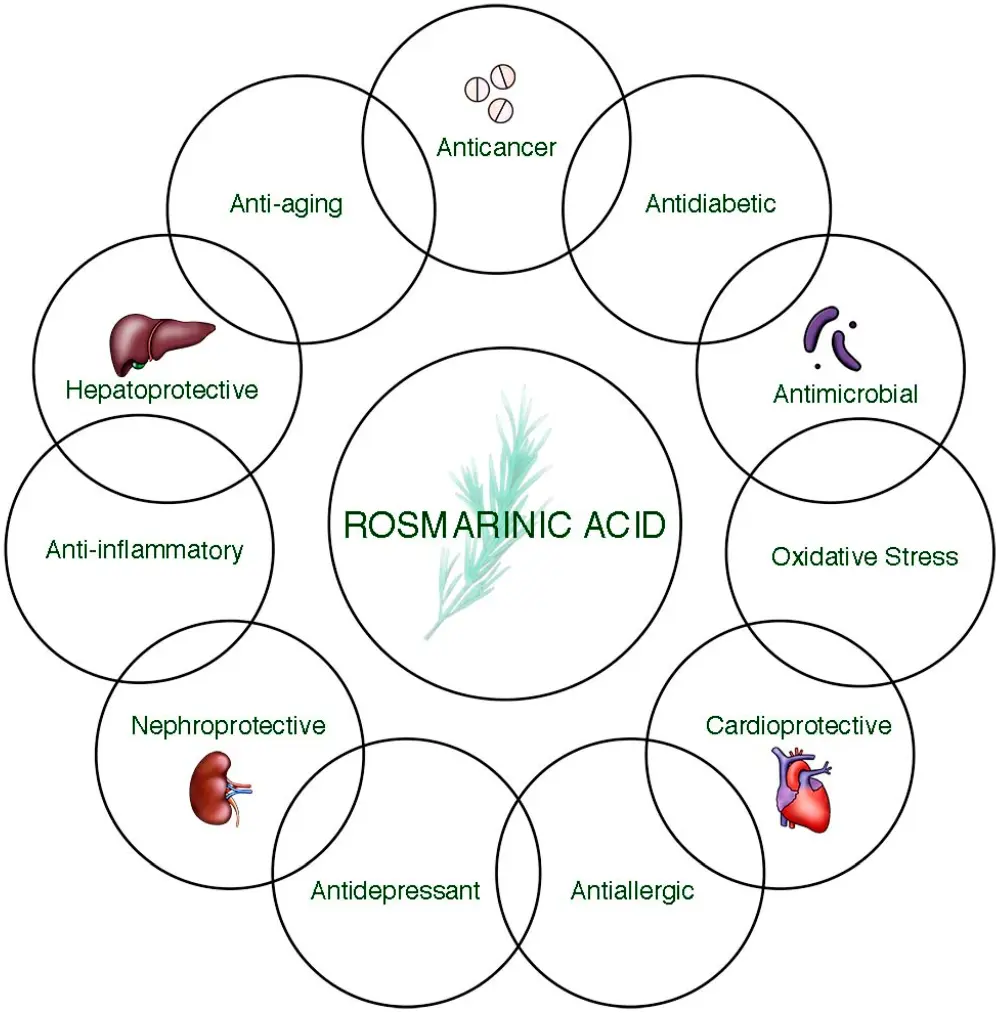
Anti-cervicitis effect and mechanism of rosmarinic acid
Rosmarinic acid (RA) is the main ingredient in Jingdaining Capsules. Modern pharmacological research has found that RA has significant anti-inflammatory and analgesic effects, with a limited inhibitory effect on various types of inflammation. Rosmarinic Acid Powder can inhibit the secretion of inflammatory factors such as IL-6 and IL-1β, exerting its anti-inflammatory effects by regulating the NF-κB pathway.
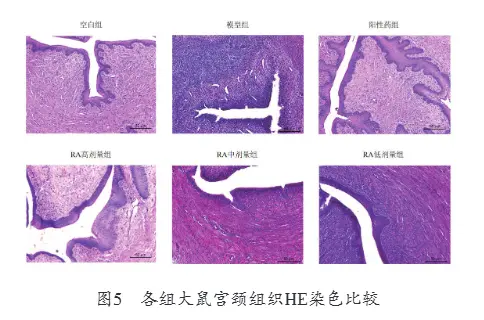
RA, a natural phenolic acid compound extracted from various plants, has recently garnered widespread attention for its anti-inflammatory properties. This study found that RA significantly reduced the expression of inflammatory factors both in vitro and in vivo. In SD rats induced by cervicitis, RA treatment significantly decreased plasma leukocyte and MDA levels, as well as pro-inflammatory factor levels in tissue homogenates, compared to the model group, demonstrating that RA can effectively regulate systemic and localized inflammation. This inhibitory effect on the release of inflammatory factors is consistent with existing research reports and reveals one of the core anti-inflammatory pathways of RA.
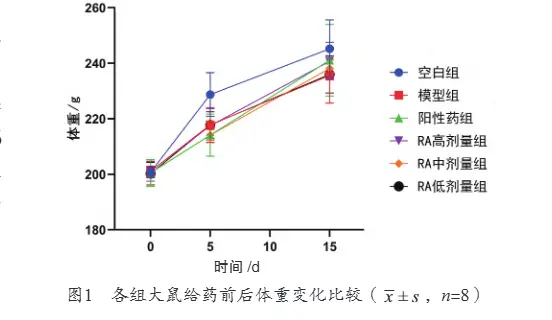
(Reference:Study on the anti-cervicitis effect and mechanism of rosmarinic acid)
Rosmarinic Acid Benefits
1. Antioxidant and Anti-Inflammatory Effects
Rosmarinic acid effectively scavenges free radicals, inhibits oxidative stress, and reduces the production of inflammatory factors (such as TNF-α and IL-6), alleviating chronic inflammation.
2. Antibacterial and Antiviral Effects
It has inhibitory effects on a variety of bacteria (such as Staphylococcus aureus and Escherichia coli) and viruses (such as influenza and herpes), making it a natural antiseptic and an aid in infection prevention and treatment.

3. Skin Protection and Whitening
In cosmetics, it can inhibit melanin production, reduce UV damage, improve pigmentation and photoaging, and promote skin barrier repair, soothing sensitive skin.
4. Neuroprotective and Anti-Allergic Effects
Research shows that it can penetrate the blood-brain barrier, reduce oxidative damage to nerve cells, and potentially improve cognitive function. It can also inhibit histamine release, alleviating allergy symptoms.
5. Cardiovascular and Metabolic Regulators
It helps lower blood sugar and lipid levels, improve endothelial function, prevent atherosclerosis, and support cardiovascular health.
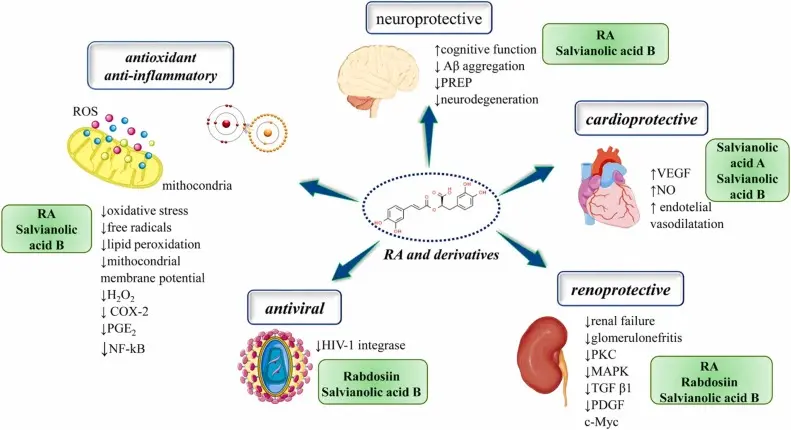
Rosmarinic Acid Uses
1. Food Industry
- Natural Preservatives: Alternatives to synthetic antioxidants (such as BHT/BHA) added to oils, meat products, and baked goods to delay oxidative rancidity and extend shelf life (usually at a dosage of 0.01%-0.1%).
- Functional Food Ingredients: Used in health beverages and dietary supplements to provide anti-inflammatory and immune-boosting properties.
2. Cosmetics and Skincare
- Antioxidant and Anti-Aging: Added to serums and creams (at a concentration of 0.1%-1%), they neutralize free radicals, reduce UV damage, and slow photoaging.
- Whitening and Soothing: Inhibits tyrosinase activity and reduces melanin production; reduces redness, swelling, and allergies, making them suitable for sensitive skin care products.
3. Pharmaceuticals and Health Products
- Anti-inflammatory and Anti-allergic Drugs: Used to relieve symptoms of allergic rhinitis, asthma, and other conditions (commonly found in oral preparations or sprays).
- Neuroprotectants: Studies have shown potential benefits for neurodegenerative diseases such as Alzheimer's and Parkinson's.
- Cardiovascular Health: Assists in regulating blood lipids and blood sugar, protects endothelial function, and is used in health supplements for the prevention of cardiovascular and cerebrovascular diseases.
4. Agriculture and Feed
- Animal Feed Additives: Replace antibiotics, enhance animal immunity, and improve the oxidative stability of meat.
- Botanical Pesticides: Leverage their antimicrobial activity to develop green pesticides and reduce chemical pesticide residues.
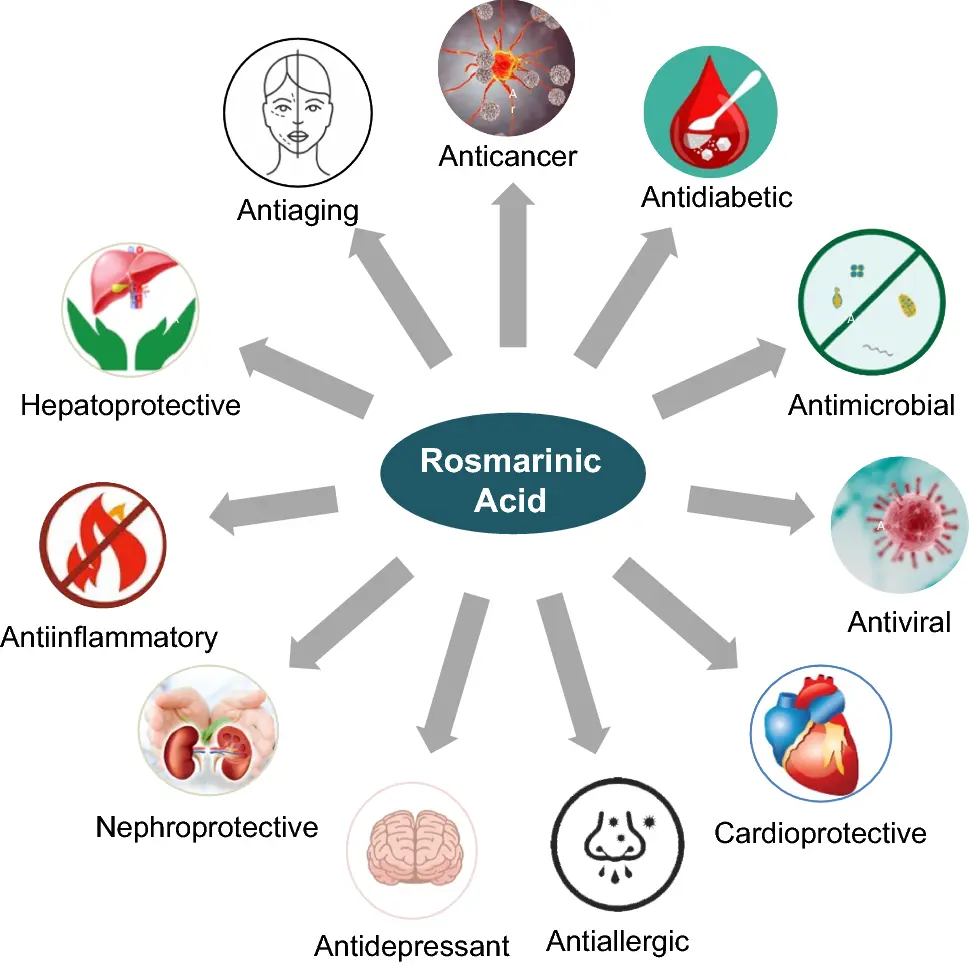
Why Choose KINTAI Rosmarinic Acid?
1.Multiple specifications (5%-98% purity) are available from stock. We also offer customization Rosmarinic Acid Powder for solubility, color, dosage, and other application-specific needs.
2.Own planting base to ensure a stable supply of raw materials and cost advantages.
3.Fresh leaf processing, and counter-current extraction, improve yield and extraction efficiency.
FAQ
Q1:Is rosemary good for aging skin?
A1:Rosemary oil has been known to be rich in antioxidants, perfect for individuals concerned with aging caused by free radicals.
Q2:What's the MOQ?
A2:Our MOQ is 1kg.
Q3:Are you a manufacturer or a trading company?
A3:We are a manufacturer and supplier. We have our own R&D team and production factory.
KINTAI Certification
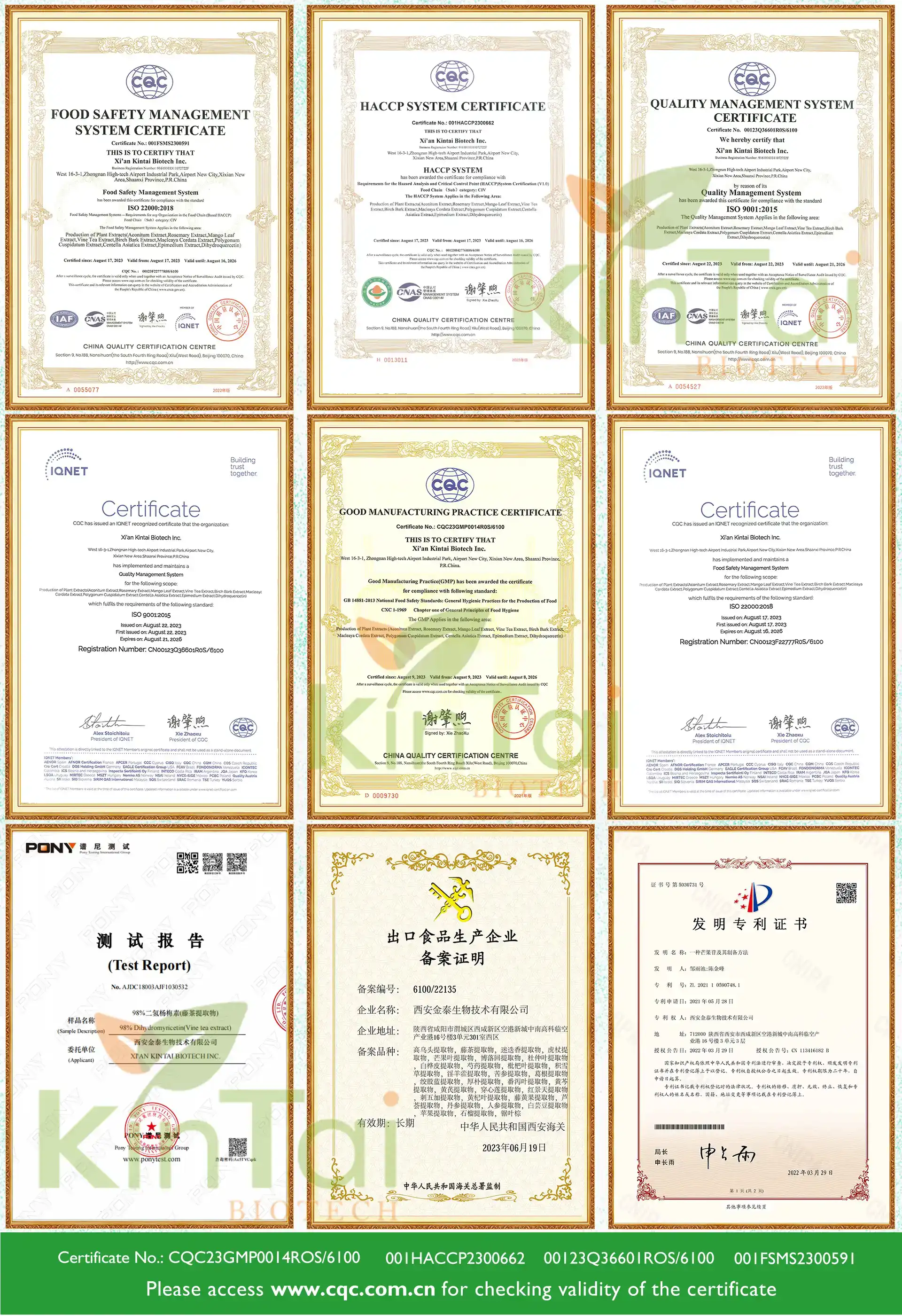
Send Inquiry
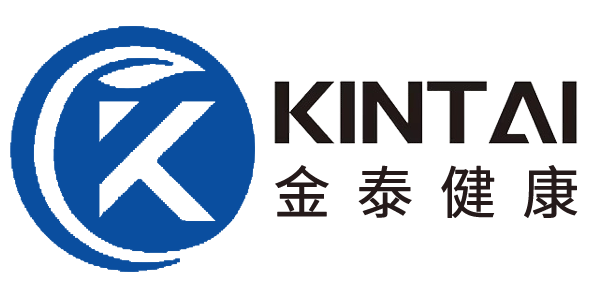

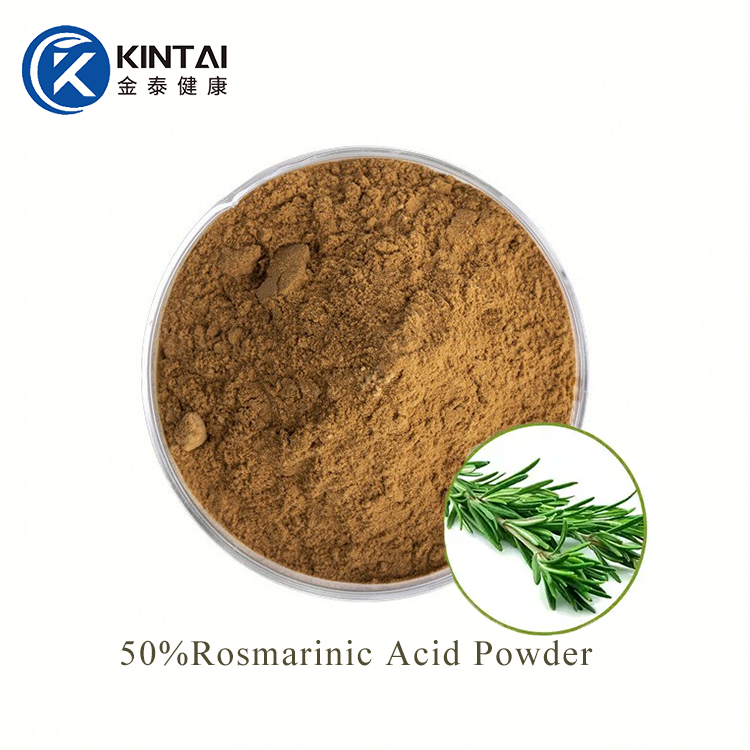
_1757917867282.jpg)
